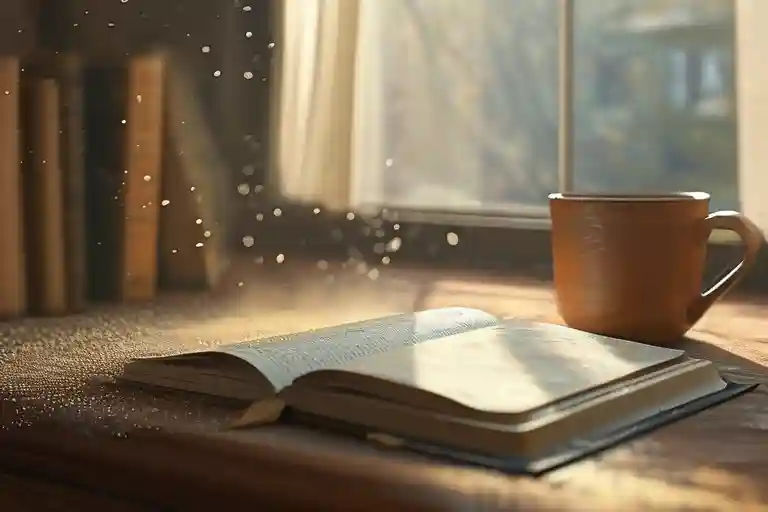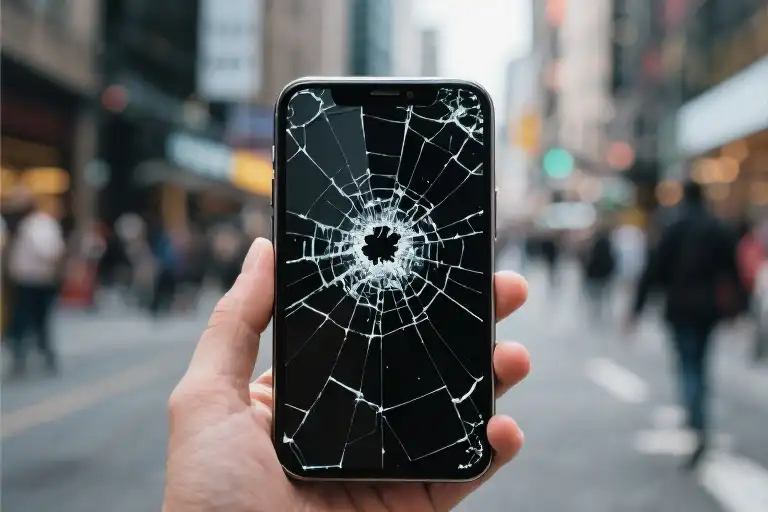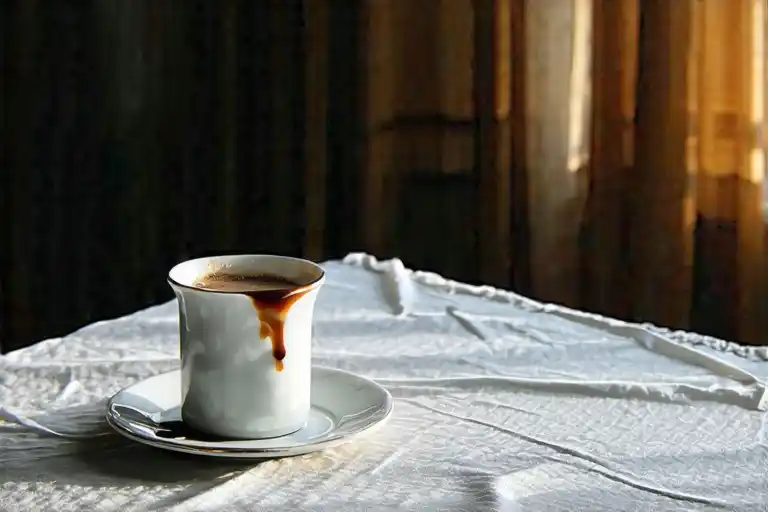In you, I see myself, and we can hold each other; stupidly, madly, deeply. Endlessly.
There’s a moment in “Beetlejuice” that has stayed with me for years, surfacing at the most unexpected times. Barbara, freshly deceased and trying to make sense of her new reality, responds to her husband Adam’s suggestion that “maybe this is Heaven” with that perfect, pragmatic puff of air. Her eyes flick upward toward their attic’s wooden, dormered ceiling as she delivers the line that encapsulates so much of our daily existence: “In Heaven there wouldn’t be dust on everything.”
We live surrounded by dust. Not because we’re particularly messy people—though I’ve been known to let dishes accumulate until the sink resembles a modern art installation—but because dust is simply what happens when life occurs in a space. My desk collects it like a museum collects artifacts: a fine layer of evidence that time is passing, that particles are settling, that something is always in motion even when we feel completely still.
This isn’t Heaven, obviously. The medical bills tucked under my keyboard confirm that, as does the torn PT tendon I shredded back in 2022 and haven’t quite gotten around to addressing. I know exactly what needs to be done about it—the doctor explained it in thorough detail, complete with diagrams and recovery timelines—but knowing and doing occupy different continents in my brain, connected by a bridge I keep meaning to cross but never quite do.
Maybe this year. Maybe next year. Maybe when some future medical examiner performs my autopsy, they’ll shake their head at the obvious solution I never implemented. I like to imagine them pausing over my remains, wondering why someone would live with something so fixable for so long. The truth is, by then I probably won’t care. I’ll be too busy investigating whether Heaven actually meets Barbara’s dust-free standards.
What fascinates me about her statement isn’t just its practicality, but its underlying assumption about perfection. We imagine Heaven as this flawless place where nothing accumulates where it shouldn’t, where no task remains perpetually unfinished, where our bodies don’t betray us with inconvenient tears and aches. But what if Heaven isn’t the absence of dust, but the presence of meaning in the dust itself? What if the divine isn’t in the elimination of life’s messiness, but in the way we learn to see patterns in the chaos?
There’s a certain comfort in the dust, if we’re being honest. It reminds us that we’re here, living and breathing and shedding skin cells onto surfaces. The dust on my desk contains fragments of yesterday’s toast, pollen from the window I opened last week, microscopic bits of the book I was reading. It’s a timeline of my existence, a silent archive of small moments.
When I look at the layer of dust gathering on my monitor’s screen, I don’t see failure or neglect anymore. I see evidence. Proof that I was here, that I lived in this space, that things happened around me. The dust becomes less about what I haven’t cleaned and more about what I have experienced.
Perhaps that’s the real existentialism of daily life—not the grand questions of meaning and purpose, but the way we choose to interpret the dust that collects around us. Do we see it as evidence of our imperfections, or as witness to our existence? The difference might be everything.
I hope there is dust on everything in Heaven. I hope there’s pork fried rice, too—the kind that comes in those white cardboard containers with the wire handles, the kind that always leaves a faint grease spot on whatever surface you place it. Because what’s Heaven if not the ultimate acceptance that perfection was never the point? What’s divinity if it can’t appreciate the beautiful, messy evidence of having lived?
The Universe on My Desk
My desk collects dust with a quiet persistence that feels almost intentional. Each morning, the same fine layer of grey powder settles across its wooden surface, coating notebooks, pens, and the forgotten coffee mug from yesterday. I watch it accumulate throughout the day, this gentle reminder of impermanence and neglect. The dust doesn’t judge my lack of cleaning; it simply exists, claiming its territory with patient determination.
This isn’t about cleanliness or household chores. The dust represents something deeper—the unavoidable residue of living. We breathe it in, track it across floors, and watch it dance in sunbeams through windows. It’s the physical manifestation of time passing, of particles rearranging themselves in silent rebellion against our attempts at order.
My torn PT tendon from 2022 shares this quality of persistent presence. Like the dust, it reminds me of things left undone, of resolutions postponed. The injury sits there in my consciousness, not painful enough to demand immediate attention but present enough to whisper of incompletion. I know exactly what to do about it—the exercises, the doctor visits, the recovery plan. Yet here we both remain, the tendon and I, in this state of suspended animation.
There’s poetry in this procrastination. The French have a term, “l’appel du vide,” the call of the void. My version might be “l’appel du non-faire,” the call of not-doing. It’s not laziness but rather a conscious, though perhaps unwise, choice to exist with certain imperfections. The dust, the injury, they become part of my daily landscape, familiar companions in this imperfect human experience.
Eating presents another layer of this existential repetition. We must feed ourselves daily, often the same meals on rotation, this endless cycle of consumption and renewal. The pork fried rice I order every Thursday from the Chinese place down the street has become ritual rather than mere sustenance. There’s comfort in this repetition, in knowing that some things remain constant even as dust accumulates and injuries linger.
These daily realities—dust, unresolved health issues, repetitive meals—form the texture of ordinary existence. They’re the background noise against which we live our lives, the minor key accompaniment to our grander ambitions. Perfection would eliminate these elements, creating some sterile version of living that might resemble heaven but would lack the gritty authenticity of actual human experience.
Perhaps that’s why Barbara’s line in “Beetlejuice” resonates so deeply. Her rejection of the perfect heaven in favor of one with dust feels like wisdom rather than cynicism. Dust means life has been lived, that spaces have been occupied, that people have moved through rooms leaving traces of themselves behind.
My desk tells a story through its dust. The thicker accumulation near the computer where I spend most hours, the lighter coating on areas rarely touched, the patterns formed by occasional wiping—these form a map of my daily existence. The tendon injury tells another story, one of physical limitation and the choices we make about what deserves immediate attention and what can wait.
And the pork fried rice? That tells the simplest story of all: that sometimes comfort comes in familiar containers, that repetition can be grounding rather than boring, that heaven might indeed include takeout from your favorite neighborhood place.
This is the universe contained on my desk and in my body and in my weekly meal routine. Not grand or dramatic, but real in its accumulation of small, imperfect details. The dust will always return no matter how often I wipe it away, the tendon will remain until I address it, and the need for nourishment will continue its daily demand. These aren’t problems to be solved but conditions to be lived with, aspects of human existence that give texture to our days.
There’s mindfulness in observing these ordinary phenomena without rushing to fix them. The dust becomes a meditation object, the injury a lesson in patience, the repeated meals a practice in appreciation of familiarity. They remind us that life happens in these small accumulations and repetitions, not just in grand moments and achievements.
Heaven without dust might be perfect, but it would lack the evidence of living. Heaven without pork fried rice would be missing one of life’s simple pleasures. And heaven without unresolved issues? That might be the most unimaginable paradise of all, because what would we have to work on, to think about, to eventually address when the time feels right?
The universe on my desk tells me that perfection is overrated, that sometimes the most profound truths lie in the dust we try to wipe away and the things we keep meaning to fix but haven’t quite gotten around to yet. And maybe that’s exactly as it should be.
The Screen as Mirror
Barbara’s retort in “Beetlejuice” hangs in the air long after the film ends, a perfect puncture to Adam’s desperate optimism. Her dismissal of his heavenly hypothesis isn’t cynical; it’s profoundly human. Heaven wouldn’t have dust because perfection requires sterility, and sterility requires the absence of life. Dust is the residue of living—skin cells shed, fibers from clothes, particles from books, microscopic evidence that someone inhabits a space. Her line works because it acknowledges what we all know but rarely articulate: the idealized version of anything, especially paradise, would be unrecognizable and frankly, unlivable. It wouldn’t be ours.
This cinematic moment functions as a cultural touchstone, a shared reference point that allows us to examine our own conditions through a borrowed lens. Popular culture, at its best, provides these mirrors—not to offer answers, but to frame better questions. The film doesn’t ponder the existential weight of dust; it simply presents a character who uses it as a metric for reality. We, the audience, bring the weight. We are the ones who look from the screen to our own shelves, our own monitors, our own neglected baseboards, and see not just dirt, but evidence. We are here. We are making a mess. We are existing.
The reflection is twofold. First, it mirrors our external reality: the physical dust we can wipe away with a cloth. Second, and more potently, it mirrors the internal accumulation—the mental clutter, the emotional silt, the tasks postponed, the emails unanswered, the tender apologies left unsaid. These are the non-physical particles that settle on the surfaces of our intentions, dimming their shine. The movie gives us permission to point at this metaphysical dust and name it for what it is: the undeniable proof of our imperfect, ongoing lives. It validates the feeling that a truly pristine state, whether of a home or a mind, might not be a state of bliss, but one of emptiness.
Viewing this through an existentialist framework, the dust becomes more than a nuisance; it becomes a choice. Every speck is a tiny monument to freedom, to the choices we make (or avoid making) every day. We choose to read instead of clean. We choose to stare out the window instead of tackle the work. We choose to let the tendon heal on its own, or not heal at all, a silent rebellion against the tyranny of optimal performance. This isn’t laziness; it’s a quiet, often unconscious, assertion of autonomy. It is the choice to be a human being rather than a perfectly efficient machine. The dust is the visible consequence of that choice, the price of admission for a life lived with other priorities.
This interplay between a pop culture artifact and personal existentialism is what makes such moments so enduring. They provide a common language for private struggles. When Barbara scoffs at the idea of a dust-free heaven, she speaks for anyone who has ever found a strange comfort in their own mess, who understands that the pursuit of spotlessness is a rejection of the very texture of life. The film offers no deep philosophical treatise on the matter; it simply presents a truth, raw and funny, and trusts us to find ourselves in it. We use these fragments of story as tools to dig into our own experiences, to unearth the connections between a throwaway line in a comedy and the core questions of meaning, choice, and what it means to live a life that feels authentically our own, dust and all.
The Philosophy of Procrastination
There’s a particular kind of knowing that exists without action, a cognitive recognition divorced from physical response. I know exactly how to address the dust accumulation on my desk—the microfiber cloth sits in the drawer, the wood polish waits under the sink. I know the exercises that would strengthen my torn peroneal tendon, the physical therapist’s number remains saved in my phone. I even know the nutritional balance required for optimal health, yet pork fried rice from the corner takeout appears with reliable frequency.
This disconnect between knowledge and action isn’t negligence; it’s an existential choice. Procrastination becomes the space where we negotiate with time itself, where we measure our limitations against infinite possibilities. The French existentialists would recognize this hesitation—this pause between intention and execution—as fundamentally human. Sartre might call it bad faith, but I find it to be perhaps the most honest relationship we have with our own limitations.
We exist in the perpetual “yet”—that tiny word that contains multitudes of human complexity. “I’ll do it yet” means both “I haven’t done it” and “I still believe in my capacity to do it.” This temporal limbo becomes our dwelling place, the psychological equivalent of the dust we neither remove nor fully ignore.
The medical examiner may someday shake their head at my unresolved physical ailments, but they’ll miss the philosophical truth: some things remain undone not because we cannot do them, but because their undone state tells a story we’re not ready to conclude. My tendon injury from 2022 isn’t just tissue damage—it’s a timestamp, a reminder of a specific moment when my body said “enough” while my mind continued racing forward.
Procrastination as existential choice acknowledges that time isn’t just something we measure in productivity or accomplishments. Sometimes time is what we spend deciding whether something deserves our attention at all. The Danish have a concept called “pyt”—an acceptance that not everything needs to be fixed immediately, that some things can simply be acknowledged and left as they are.
This year, maybe next year, perhaps never—these aren’t failures of planning but recognitions of life’s fluidity. We maintain open loops not because we’re incompetent, but because we understand that some questions deserve to remain questions. The dust will still be there tomorrow, and the day after, and the day after that. It becomes part of the landscape, like mountains or rivers—not something to be conquered but something to coexist with.
My physical therapist would disagree, but my tendon injury has become philosophical furniture in the house of my self-understanding. It reminds me that healing isn’t always linear, that some things break and remain broken in ways that don’t prevent movement but certainly alter it. The body remembers what the mind tries to forget, and sometimes procrastination is just giving the body time to speak its truth.
We live in the space between intention and action, and that space isn’t empty—it’s filled with the dust of considerations, the particles of second thoughts, the microscopic debris of alternative possibilities. What looks like avoidance might actually be deep consideration. What appears to be laziness might be respect for the complexity of simple actions.
The eternal “maybe this year” isn’t a failure of resolution but an acknowledgment that time operates on its own schedule. We plant seeds of intention without knowing which seasons will bring growth. Some actions require not just willingness but readiness, and readiness can’t be rushed without damaging the action itself.
So the dust remains, and the tendon still aches on rainy days, and the pork fried rice continues to arrive in white cardboard containers. These aren’t failures but features—the necessary imperfections that make this life distinctly, beautifully earthly. Heaven might not have dust, but we do, and perhaps that’s what makes our existence interesting.
Procrastination becomes the ultimate expression of free will—the choice to not choose, to let things remain in potentiality rather than actuality. In a world obsessed with productivity and resolution, leaving things undone becomes a radical act of self-definition. We are not just what we do, but what we choose not to do—what we leave for tomorrow, or next year, or never.
The medical examiner may tut at my unresolved physical issues, but they’ll be looking at the wrong evidence. The truth isn’t in what we fix but in what we learn to live with, what we integrate into our understanding of ourselves. My tendon injury isn’t a problem to be solved but a part of my story to be understood.
This year, maybe next year, perhaps never—these aren’t excuses but acknowledgments that some things operate on their own timeline. We can know exactly what to do and still choose not to do it, and that space between knowledge and action is where we truly live.
The Fried Rice in Heaven
There’s a peculiar comfort in imagining the medical examiner’s gloved hands, the cold steel of the autopsy table, the clinical brightness of the room that would finally reveal all my physical failings. They’d shake their head at the torn PT tendon, that persistent injury I carried since 2022 like some strange badge of honor. “Why didn’t she ever get this fixed?” they might murmur to the assistant, puzzled by this evidence of human procrastination preserved in tissue and sinew.
But I won’t be there to explain. I’ll be elsewhere, perhaps dusting picture frames in some version of Heaven that doesn’t match anyone’s expectations. The thought doesn’t frighten me—this imagined post-mortem judgment of my choices. If anything, it feels like the ultimate liberation from having to explain myself, from having to justify why some things remained undone despite knowing exactly how to do them.
We build heavens in our minds as places of perfection, where no dust settles on surfaces and no injuries go untreated. We imagine a state of being where everything is resolved, completed, perfected. But what if Heaven isn’t the absence of dust, but the presence of meaning in the dust itself? What if the divine isn’t in the elimination of our human messiness, but in the embrace of it?
I find myself hoping for a Heaven that understands the poetry of unfinished business. A place where dust still gathers on windowsills, where some books remain half-read, where conversations can be picked up and dropped without urgency. A Heaven that recognizes that perfection isn’t the absence of imperfection, but the integration of it into something whole and human.
And while we’re reimagining Heaven, let’s include pork fried rice. Not some celestial manna or ambrosia, but the particular greasy comfort of takeout containers and slightly too-salty soy sauce. The kind of fried rice that comes in those white boxes with the wire handles, the kind that tastes better at midnight than at noon, the kind that leaves you both satisfied and slightly guilty.
Pork fried rice embodies everything Heaven shouldn’t be according to traditional visions: it’s messy, imperfect, occasionally contains questionable meat choices, and yet it brings profound comfort. It’s the food of late nights and tired souls, of celebrations and ordinary Tuesdays. It doesn’t aspire to be anything more than what it is—a simple pleasure that acknowledges our human need for both nourishment and nostalgia.
This isn’t about rejecting transcendence, but about redefining it. Maybe transcendence isn’t rising above our human condition, but diving deeper into it until we find the sacred in the ordinary. The divine in the dust. The eternal in the everyday.
So I hope there’s dust on everything in Heaven. I hope there are half-finished projects and slightly overdue library books. I hope there are conversations that meander without particular destination and afternoons that stretch into eternity without particular purpose. I hope there’s the particular satisfaction of looking at a surface and seeing the fine layer of dust that says time has passed here, life has happened here.
And when the hunger for something both familiar and comforting arises, I hope there’s pork fried rice—steaming, slightly greasy, filled with the humble ingredients of earthly existence. Not because we need to eat in Heaven, but because the act of sharing food, of tasting something that connects us to memories and to each other, is itself a kind of prayer.
This vision of Heaven isn’t about escaping our humanity, but about finally understanding it. It’s about recognizing that the dust isn’t what separates us from perfection, but what connects us to the reality of being alive. That the unfinished business of our lives isn’t a failure, but the very material of our existence.
So let Heaven have dust on everything. Let it have pork fried rice. Let it have all the imperfect, messy, beautiful things that make this life worth living, amplified and eternalized. Not a rejection of our earthly experience, but its ultimate affirmation.





